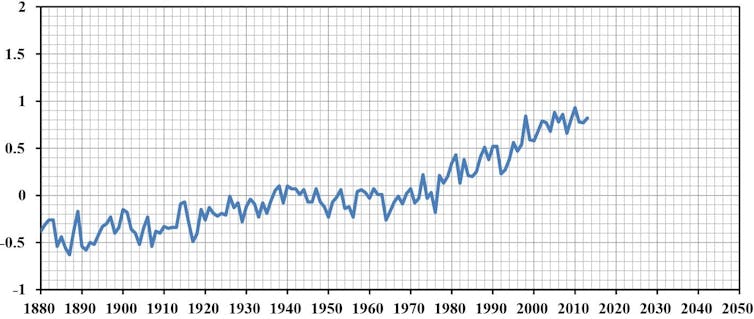Most Climate Change Sceptics Are Right-Wing, And There’s A Psychological Reason Why

The scientific evidence for climate change is unequivocal: 97 per cent of actively publishing climate scientists agree that human activities are causing global warming. Given the same evidence, why do some people become concerned about human-caused climate change while others deny it? In particular, why are people who remain sceptical about climate change often identified as right-wing conservatives?
According to a recent poll conducted in Canada, 81 per cent of Liberal and 85 per cent of New Democrat voters believe that climate change is a fact and is mostly caused by emissions from vehicles and industrial facilities. Only 35 per cent of Conservative voters believe the same thing.
Within the United States, a poll in 2006 showed that 79 per cent of Democrats versus 59 per cent of Republicans said there was solid evidence that the average temperature on Earth has been getting warmer. This divide has not only endured, but widened over time to 92 per cent of Democrats and 52 per cent of Republicans by 2017.
Such a growing divide has significant implications for setting policy agendas that aim to fight climate change. For example, 77 per cent of Democrats versus 36 per cent of Republicans in 2017 say stricter environmental laws and regulations are worth the cost.
What is driving the partisan divide?
Past studies provided several accounts to explain public scepticism on climate change, such as a lack of knowledge or understanding of the causes of climate change, a lack of sense of urgency or insufficient awareness about the issue. However, these accounts do not completely explain the partisan polarisation over the years when an increasing volume of information and evidence on climate change has been presented to the public.
Recent efforts to explain partisan polarisation suggest that people seek and interpret information that is consistent with their political ideology and party identification, and selectively expose themselves to news media that is consistent with their existing motivations and beliefs.
Conservatives may seek evidence that challenges the scientific knowledge regarding climate change, which aligns with their existing knowledge acquired from political leaders whom they trust. Extending beyond these studies, we suggested a new explanation of how motivations and ideologies lead to this polarised view on climate change.
Explaining the divide
Our previous work demonstrates that liberals who are concerned about climate change pay more attention to climate-related words, such as carbon, over neutral words, such as coffee. Conservatives who are not concerned about climate change do not show a difference in the amount of attention they pay to climate-related words and neutral words, suggesting that political orientations are associated with the amount of attention paid to climate-related information.
Read more:
Why some conservatives are blind to climate change
Based on these findings, we recently proposed that people’s political motivations shape their visual attention to climate change evidence, which influences their perception of the evidence and subsequent actions to mitigate climate change. These altered perceptions and actions can reinforce their initial motivations, further entrenching the divide. To put simply, what you believe influences what you see, and guides your future actions.
In our study, we presented a graph showing the global temperature change from 1880 to 2013 to participants. We found that the more liberal people were, the more attention they paid to the rising phase of the temperature curve (1990 to 2013) relative to the flat phase of the curve (1940 to 1980). This shows that liberals and conservatives naturally pay more attention to the part of the graph that is consistent with their beliefs.

In another experiment, we manipulated attention by colouring different parts of the temperature curve to deliberately bias attention to stronger change (the rising phase) or smaller change (the flat phase) in temperature. After viewing the graph, we tested whether biasing people’s attention to different climate evidence influenced their actions to mitigate climate change. Would they, for example, sign a climate change petition or donate to an environmental organisation?
We found that liberals were more likely to sign the petition or donate when the rising phase was highlighted than when the flat phase was highlighted. In other words, when attention was drawn to climate evidence that aligns with their prior beliefs, people were more likely to act.
In contrast, conservatives were less likely to sign the petition or donate when the rising phase was highlighted than when the flat phase was highlighted. This shows that when attention was drawn to motivational evidence that was inconsistent with their beliefs, people were less likely to act.
It may seem paradoxical, but our research shows that an action can be encouraged by drawing people’s attention to the evidence that matches their prior motivations.
Overall, our framework suggested that people’s motivations prevent them from attending to and perceiving climate change evidence accurately, which influences their subsequent actions. Specifically, conservatives may focus selectively on climate data that confirm their beliefs, leading to inaction on mitigating climate change.
Our findings, along with traditional accounts, offer a few ideas to aid our understanding on why conservatives are more sceptical about climate change. To encourage accurate interpretation of climate data and actions among conservatives, we can frame climate change consistently with their values, such as framing mitigation efforts as promoting economic or technological development. Or, we can provide information on peer group norms to shift attention, since people may have incorrect beliefs of how their peers view a controversial issue.
Yu Luo, PhD student, Psychology, University of British Columbia; Jiaying Zhao, Assistant Professor, Psychology, University of British Columbia, and Rebecca M. Todd, Associate Professor, Psychology, University of British Columbia
This article is republished from The Conversation under a Creative Commons license. Read the original article.
